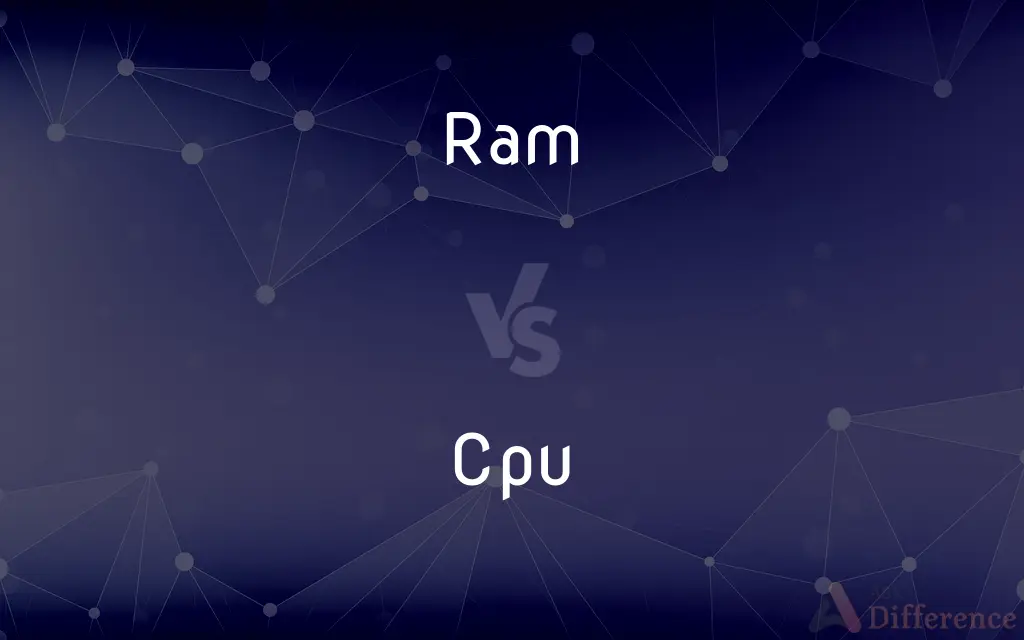RAM vs. CPU — What's the Difference?
By Tayyaba Rehman — Updated on September 22, 2023
RAM is a computer's temporary data storage, while CPU is the core processor executing instructions. Both are integral for computer operation.

Difference Between RAM and CPU
Table of Contents
ADVERTISEMENT
Key Differences
Within the vast landscape of computer components, RAM and CPU are fundamental players. RAM, or Random Access Memory, serves as a temporary storage space that provides high-speed data access to the CPU. On the other hand, the CPU, or Central Processing Unit, acts as the brain of the computer, processing instructions and controlling other components.
The collaboration between RAM and CPU is symbiotic. While RAM holds data ready for processing, the CPU retrieves and processes this data. RAM's efficiency in delivering data can impact how quickly the CPU executes instructions. Conversely, a high-performance CPU necessitates an efficient RAM to keep pace. The balance between RAM and CPU is critical for optimal computer performance.
For example, even with a powerful CPU, inadequate RAM can lead to sluggish performance. In essence, while the CPU carries out tasks and runs software, RAM ensures that the CPU has quick access to necessary data.
Comparison Chart
Primary Role
Temporary data storage.
Executes instructions and processes data.
Type
Volatile memory.
Processor.
ADVERTISEMENT
Speed
Measured in MHz or GHz, indicates data transfer rate.
Measured in GHz, indicates processing speed.
Upgradability
Can be added or replaced to improve performance.
Can be upgraded, but may require a new motherboard or other parts.
Physical Form
Memory sticks or modules.
Chips with pins or contact points.
Compare with Definitions
Ram
A computer's volatile memory used for temporary data storage.
Upgrading the RAM can help improve multitasking capabilities.
Cpu
The primary unit executing program commands.
Overclocking the CPU can boost its speed but may also increase heat.
Ram
An essential component for fast data retrieval.
Without enough RAM, computers can become slow and unresponsive.
Cpu
A chip that interprets and carries out operations.
The new computer comes with an 8-core CPU for advanced multitasking.
Ram
Hardware that works in tandem with the CPU for optimal performance.
For gaming, having sufficient RAM is as crucial as a good CPU.
Cpu
The brain of a computer that processes instructions.
The CPU is responsible for running the software on the computer.
Ram
An uncastrated male sheep.
Cpu
A central component governing other computer parts.
A faster CPU can significantly improve a computer's performance.
Ram
A battering ram.
Cpu
Essential for tasks like calculations and data processing.
Video editing software often requires a powerful CPU for smooth operation.
Ram
The falling weight of a piledriving machine.
Cpu
The central processing unit, that part of the electronic circuitry of a computer in which the arithmetic and logical operations are performed on input data, which are thereby converted to output data; it is usually located on the mainboard, or motherboard, of a computer. The CPU and the memory form the central part of a computer to which the peripherals are attached. Most personal computers as of 1998 had only one CPU, but some computers may have more than one CPU.
Ram
A hydraulic water-raising or lifting machine.
Cpu
(computer science) the part of a computer (a microprocessor chip) that does most of the data processing; the CPU and the memory form the central part of a computer to which the peripherals are attached
Ram
Roughly force (something) into place
He rammed his stick into the ground
Ram
(of a place) be very crowded
The club is rammed to the rafters every week
Ram
Digital memory hardware in which information can be accessed in any order with equal speed.
Ram
A male sheep.
Ram
A battering ram.
Ram
The weight that drops in a pile driver or steam hammer.
Ram
The plunger or piston of a force pump or hydraulic press.
Ram
A hydraulic ram.
Ram
A projection on the prow of a warship, used to batter or cut into enemy vessels.
Ram
A ship having such a projection.
Ram
Ram See Aries.
Ram
To strike or drive against with a heavy impact; butt
Rammed the door with a sledgehammer until it broke open.
Ram
To force or press into place.
Ram
To cram; stuff
Rammed the clothes into the suitcase.
Ram
To force passage or acceptance of
Rammed the project through the city council despite local opposition.
Ram
A male sheep, typically uncastrated.
Ram
A battering ram; a heavy object used for breaking through doors.
Ram
A warship intended to sink other ships by ramming them.
Ram
A reinforced section of the bow of a warship, intended to be used for ramming other ships.
Ram
A piston powered by hydraulic pressure.
Ram
An act of ramming.
Ram
A weight which strikes a blow, in a ramming device such as a pile driver, steam hammer, or stamp mill.
Ram
(ambitransitive) To collide with (an object), usually with the intention of damaging it or disabling its function.
The man, driving an SUV, then rammed the gate, according to police.
[http://www.thestar.com.my/news/nation/2016/12/29/snatch-thieves-rammed-by-victim-accidentally/ Two snatch thieves who snatched a woman's bag experienced swift karma when their victim accidentally rammed into their motorcycle.]
Ram
(transitive) To strike (something) hard, especially with an implement.
To build a sturdy fence, you have to ram the posts deep into the ground.
Ram
(transitive) To seat a cartridge, projectile, or propellant charge in the breech of a firearm by pushing or striking.
After placing the cartridge in the musket, ram it down securely with the ramrod.
Ram
(transitive) To fill or compact by pounding or driving.
Rammed earth walls
Ram
(slang) To thrust during sexual intercourse.
Ram
(Northern England) rancid; offensive in smell or taste.
Ram
The male of the sheep and allied animals. In some parts of England a ram is called a tup.
Ram
Aries, the sign of the zodiac which the sun enters about the 21st of March.
Ram
An engine of war used for butting or battering.
Ram
A hydraulic ram. See under Hydraulic.
Ram
The weight which strikes the blow, in a pile driver, steam hammer, stamp mill, or the like.
Ram
The plunger of a hydraulic press.
Ram
To butt or strike against; to drive a ram against or through; to thrust or drive with violence; to force in; to drive together; to cram; as, to ram an enemy's vessel; to ram piles, cartridges, etc.
[They] rammed me in with foul shirts, and smocks, socks, foul stockings, greasy napkins.
Ram
To fill or compact by pounding or driving.
A ditch . . . was filled with some sound materials, and rammed to make the foundation solid.
Ram
The most common computer memory which can be used by programs to perform necessary tasks while the computer is on; an integrated circuit memory chip allows information to be stored or accessed in any order and all storage locations are equally accessible
Ram
(astrology) a person who is born while the sun is in Aries
Ram
The first sign of the zodiac which the sun enters at the vernal equinox; the sun is in this sign from about March 21 to April 19
Ram
A tool for driving or forcing something by impact
Ram
Uncastrated adult male sheep;
A British term is `tup'
Ram
Strike or drive against with a heavy impact;
Ram the gate with a sledgehammer
Pound on the door
Ram
Force into or from an action or state, either physically or metaphorically;
She rammed her mind into focus
He drives me mad
Ram
Undergo damage or destruction on impact;
The plane crashed into the ocean
The car crashed into the lamp post
Ram
Crowd or pack to capacity;
The theater was jampacked
Ram
A type of memory allowing random access irrespective of location.
Modern computers usually come with at least 8GB of RAM.
Ram
A memory unit erased when the power is off.
Save your work often, as data stored in RAM is lost when the computer is turned off.
Common Curiosities
Why is RAM called "volatile"?
Because its data is lost when power is removed.
Can a computer work without a CPU?
No, the CPU is essential as it processes instructions and runs software.
Which is more important, RAM or CPU?
Both are crucial. CPU processes tasks, while RAM supports the CPU by holding data for quick access.
Can I add more RAM to boost my CPU's performance?
Adding RAM can improve overall performance, but it won't increase the CPU's processing speed.
What's the difference between a dual-core and quad-core CPU?
A dual-core CPU has two processing units, while a quad-core has four, allowing more simultaneous processing.
Why might my computer use more RAM over time?
Running more applications, background processes, or having many browser tabs open can increase RAM usage.
How do I know if I need to upgrade my CPU?
If your computer is slow with tasks like software running or multitasking, a CPU upgrade might help.
Is RAM the same as storage?
No, RAM is temporary memory, while storage (like HDD or SSD) retains data long-term.
What happens if the CPU overheats?
It can cause the computer to shut down, slow performance, or even damage the CPU.
How can I check my RAM usage?
On most operating systems, you can check via the task manager or system monitor.
Do all computers have the same type of CPU?
No, CPUs vary in brand, model, and capabilities.
Does more RAM mean a faster computer?
More RAM can mean smoother multitasking and handling of large files, but overall speed also depends on other factors like the CPU.
Is a CPU's performance only determined by its speed?
No, other factors like architecture, cache size, and core count also impact performance.
Can I replace the CPU in my laptop?
It depends on the laptop. Some have replaceable CPUs, while others are soldered and not easily replaceable.
Why do some applications recommend a certain amount of RAM?
To ensure smooth performance and effective functioning of the application.
Share Your Discovery

Previous Comparison
Inspiration vs. Expiration
Next Comparison
Toilet vs. BathroomAuthor Spotlight
Written by
Tayyaba RehmanTayyaba Rehman is a distinguished writer, currently serving as a primary contributor to askdifference.com. As a researcher in semantics and etymology, Tayyaba's passion for the complexity of languages and their distinctions has found a perfect home on the platform. Tayyaba delves into the intricacies of language, distinguishing between commonly confused words and phrases, thereby providing clarity for readers worldwide.













































